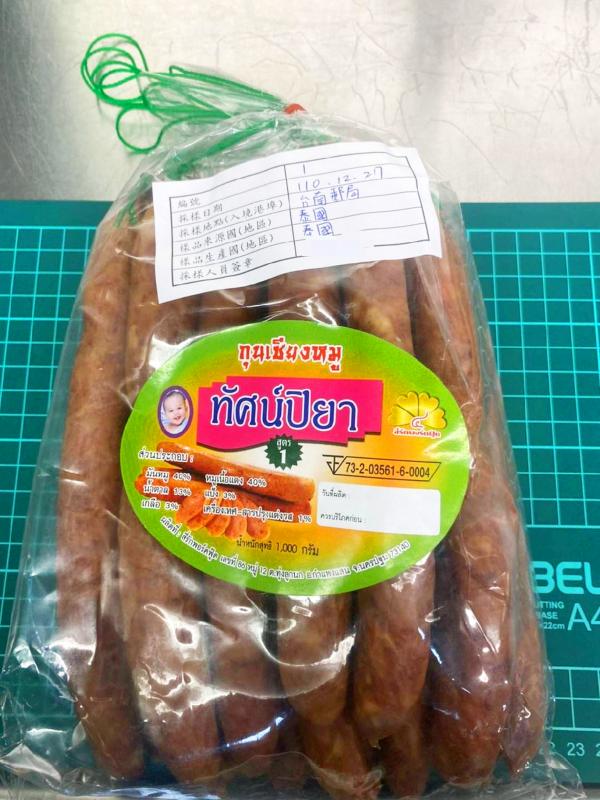Migrant workers who are caught illegally importing meat products from areas affected by African swine fever or receive such products without notifying the authorities would be fined, have their employment permits revoked and be deported, the Ministry of Labor said in a statement on Friday.
Taiwan has been on alert as international deliveries have been found to contain meat products that tested positive for African swine fever, the ministry said.
A package from Thailand was flagged by a post office in Tainan on Dec. 15 last year after it was found to contain sausages. A lab test on Dec. 17 found that the sausages contained the virus.

Photo courtesy of the Bureau of Animal and Plant Health Inspection and Quarantine via CNA
The initial result was confirmed by a test conducted by the Council of Agriculture on Dec. 22.
With the Lunar New Year holiday approaching, the ministry reminded migrant workers not to illegally import meat products, buy such products from unknown origins online, or ask friends or family members to send them to Taiwan.
People who are found to have illegally imported such products face a jail term of up to seven years and a fine of up to NT$3 million (US$108,342), it said.
Any parcels containing meat products sent by family or friends overseas should be given to the Bureau of Animal and Plant Health Inspection and Quarantine or a local animal protection office to be destroyed, the ministry said, adding that breaches would result in fines of up to NT$150,000 based on the Employment Service Act (就業服務法).
The government might also revoke an offender’s employment permit, ask them to leave the country and bar them from working in Taiwan, it said.
The ministry also reminded employers to inform their foreign staff about African swine fever prevention laws and regulations.
Employers should also ensure that food waste from migrant workers’ dormitories is not sent to pig farms, the ministry said.
African swine fever is not known to infect humans, but can be fatal to pigs, and an outbreak might devastate the country’s high-value pig farming industry.
The law requires kitchen waste to be steam-heated at no less than 90°C for about an hour to kill the virus.
On Aug. 23, Kaohsiung police seized 40 packages of shredded chicken and 20 packages of beef jerky, weighing 17kg in total, from the dorm room of a Vietnamese migrant worker. The shredded chicken later tested positive for African swine fever.
A week earlier, 71kg of illegally imported meat products from Vietnam were seized in New Taipei City. They were later also found to contain the virus.
Migrant workers who have questions about African swine fever should call the 1955 counseling and protection hotline, the ministry said.

INVESTIGATION: The case is the latest instance of a DPP figure being implicated in an espionage network accused of allegedly leaking information to Chinese intelligence Democratic Progressive Party (DPP) member Ho Jen-chieh (何仁傑) was detained and held incommunicado yesterday on suspicion of spying for China during his tenure as assistant to then-minister of foreign affairs Joseph Wu (吳釗燮). The Taipei District Prosecutors’ Office said Ho was implicated during its investigation into alleged spying activities by former Presidential Office consultant Wu Shang-yu (吳尚雨). Prosecutors said there is reason to believe Ho breached the National Security Act (國家安全法) by leaking classified Ministry of Foreign Affairs information to Chinese intelligence. Following interrogation, prosecutors petitioned the Taipei District Court to detain Ho, citing concerns over potential collusion or tampering of evidence. The

‘FORM OF PROTEST’: The German Institute Taipei said it was ‘shocked’ to see Nazi symbolism used in connection with political aims as it condemned the incident Sung Chien-liang (宋建樑), who led efforts to recall Democratic Progressive Party (DPP) Legislator Lee Kun-cheng (李坤城), was released on bail of NT$80,000 yesterday amid an outcry over a Nazi armband he wore to questioning the night before. Sung arrived at the New Taipei City District Prosecutors’ Office for questioning in a recall petition forgery case on Tuesday night wearing a red armband bearing a swastika, carrying a copy of Adolf Hitler’s Mein Kampf and giving a Nazi salute. Sung left the building at 1:15am without the armband and apparently covering the book with a coat. This is a serious international scandal and Chinese

Seventy percent of middle and elementary schools now conduct English classes entirely in English, the Ministry of Education said, as it encourages schools nationwide to adopt this practice Minister of Education (MOE) Cheng Ying-yao (鄭英耀) is scheduled to present a report on the government’s bilingual education policy to the Legislative Yuan’s Education and Culture Committee today. The report would outline strategies aimed at expanding access to education, reducing regional disparities and improving talent cultivation. Implementation of bilingual education policies has varied across local governments, occasionally drawing public criticism. For example, some schools have required teachers of non-English subjects to pass English proficiency

TRADE: The premier pledged safeguards on ‘Made in Taiwan’ labeling, anti-dumping measures and stricter export controls to strengthen its position in trade talks Products labeled “made in Taiwan” must be genuinely made in Taiwan, Premier Cho Jung-tai (卓榮泰) said yesterday, vowing to enforce strict safeguards against “origin laundering” and initiate anti-dumping investigations to prevent China dumping its products in Taiwan. Cho made the remarks in a discussion session with representatives from industries in Kaohsiung. In response to the US government’s recent announcement of “reciprocal” tariffs on its trading partners, President William Lai (賴清德) and Cho last week began a series of consultations with industry leaders nationwide to gather feedback and address concerns. Taiwanese and US officials held a videoconference on Friday evening to discuss the